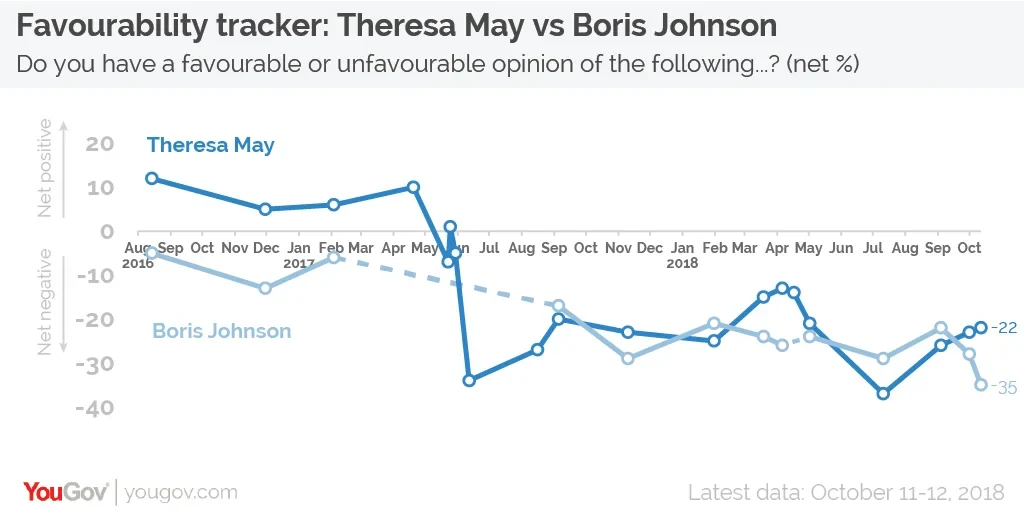The former foreign secretary now has a net negative favourability rating among both groups
The speech given by Boris Johnson may have been covered just as closely by the press as the Prime Minister's, and the former foreign secretary’s head may adorn the top half of the Daily Telegraph on a weekly basis, but neither of these things seem to be doing him much good.
New YouGov data can reveal that the proportion of people with a favourable view of Boris has slumped over the last six weeks.
At the beginning of September Boris Johnson’s favourability figures were marginally less bad than Theresa May’s, at -22 to the Prime Minister’s -26.
However, by the eve of his speech to Conservative conference Boris’s score had fallen to -28 and has subsequently fallen further to -35. By contrast, Theresa May’s score has marginally improved over the same time period to -22.
Worse still for the Chequers-slamming Tory rebel, the change seems to have come primarily among Conservative and Leave voters. Among those who voted for the Tories last year, Boris Johnson was riding high with a net favourability score of +26 at the beginning of September. Fast forward one month and that score had fallen to +6, and it has since come down to -4 with 44% holding a favourable view of Boris compared to 48% with an unfavourable opinion.

Similarly, among Leave voters that score has fallen from +25 to +12 and now -1 over the same timeframe (45% currently have a favourable view and 46% an unfavourable one).
Jacob Rees-Mogg: familiarity breeds contempt
Just over a year ago YouGov conducted our first favourability survey to include Jacob Rees-Mogg, who was starting to develop a relatively prominent public profile. At that point almost half of Britons had a view on the Eurosceptic MP, with 18% having a favourable view, 30% an unfavourable one and 51% answering “don’t know”.
Since then, Rees-Mogg has featured in two further favourability surveys: one in January of this year and this most recent one. YouGov can reveal that Rees-Mogg’s public profile has continued to grow – the proportion of Britons answering “don’t know” when asked how they felt about him fell eight points to 43% in January and a further eight points to 35% now.
Unfortunately for him, almost all of these don’t knows have transferred to the unfavourable category. The proportion of people viewing Rees-Mogg favourably is essentially unchanged, having been on 18% in September 2017, 19% in January and remaining on 19% today. By contrast, the proportion who have an unfavourable view has grown from an initial 30% to 38% in January and 46% today (meaning his net favourability scores have gone from a starting point of -12 to -19 and now to -27).
Even among Conservative voters this narrative remains true, albeit with Rees-Mogg being popular overall. The proportion of 2017 Tory voters with a favourable view of Rees-Mogg has only changed from 39% to 42% between September last year and now, while the amount with an unfavourable view has increased from 17% to 29%.
Only among Leave voters has greater familiarity not necessarily bred exclusively greater contempt. Favourable views of Rees-Mogg have seen a modest increase from 29% to 37% over the time period, although unfavourable views have grown at a slightly faster rate – from 19% to 31%.
Photo: Getty






